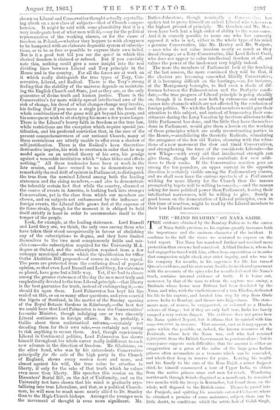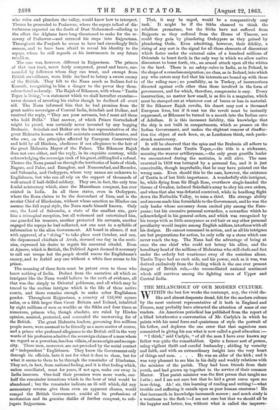THE "BLIND BRAHMIN" ON NANA SAIIII3.
THE evidence obtained by the Bombay Police as to the career of Nana Sahib previous to his capture greatly increases both the importance and the ominous character of the incident. It confirms to tile full the views we ventured to express on the brief report. The Nana has wandered further and received more protection than even we had conceived. A blind Brahmin, whom he had engaged to travel with him, either from superstition or in order that compassion might check over strict inquiry, and who was in his company for months, in his eagerness for life has turned Queen's evidence, and his statement, besides its incidental agreement with the accounts of the spies who for months followed the Nana's track, contains internal evidence of truth. It is borne out, moreover, by that of the man to whom the capture was owing, a Brahmin whose house near Bithoor had been desolated by the Nana, a»d who, with the vindictiveness of a true I limits), dedicated his life to his capture, and hunted him step by step from Oude across India to Bombay, and thence into Rajpootana. The state- ments may, of course, be exaggerated, or coloured as a Ilindoo colours all things ; but if they are only half true, India has barely escaped a very serious danger. The evidence does not prove how the Nana quitted Nepali], but it Ohms that he carried with him some 800,000i. in treasure. That amount, vast as it may appear, is quite within the possible, or, indeed, the known resources of the Peishwah, whose heir the Nana was, and who had received 2,500,000/. from the British Government in pensions alone ; but its conveyance suggests such difficulties that the amount is either an exaggeration or a guess at the value of the large gems Indian princes often accumulate as a treasure which can be concealed, and which they keep in reserve for years. Leaving his wealth and his family to the care of the Ram Rajah, a minor Rajpoot chief, he himself commenced a tour of Upper India, to obtain from the native princes arms and men for revolt. Wandering- northwards through Scinde disguised as a mendicant, he remained two months with the troops in Kurrachee, but found them, on the whole, well disposed to the British cause. Thence he passed into the Punjaub, and quitting his associate entered CaEhmere, where he obtained a promise of some assistance, subject, there can be little doubt, to conditions which the astute heir of Golab Singh,
who rules and plunders the valley, would know how to interpret. 'Thence he proceeded to Peshawur, where the sepoys talked of dis- turbances expected on the death of Dost Mohammed—alluding to the effort the Afghans have long threatened to make for the re. covery of Peshawur—and retraced his steps into Rajpootana. Throughout the Punja.ub he seems to have had exceedingly little success, and to have been afraid to reveal his identity to the sepoys, whom he still regards as his instruments in any future rebellim.
The case was, however, different in Rajpootana. The princes of that vast tract, never fairly conquered, proud and brave, sur- rounded by followers whom they can trust, and exempt from British surveillance, were little inclined to betray a sworn enemy of the British. They felt to the Nana much as Italians feel to Kossuth, recognizing in him a danger to the power they them- selves dread so keenly. The Rajah of Bikaneer, with whom" Tantia Topee is living,"—a statement which we shall hereafter examine-- never dreamt of arresting his visitor though he declined all overt aid. The Nana informed him that he had promises from the great native sovereigns of Central India, Scincliah and Holkar, and received the reply, "They are your servants, but I must aid those who hold Delhi." That answer, of which Prince Gortschakoff might be proud, was certainly never invented by any begging Brahmin. Scindiah and Holkar are the last representatives of the great Mahratta houses, who still maintain considerable armies, and who owe, on the principles affected by European Conservatives and held by all Hindoos, obedience if not allegiance to the heir of the great Mahratta Mayor of the Palace. The Bikaneer Rajah does not owe either, and the reply, in its exquisite courtesy, while acknowledging the sovereign rank of his guest, stillimplied a refusal. Thence the Nana passed on through the territories of hosts of chiefs, Nagore, and Pelee, and Ramghur, and Nusseerabad, and Boondee, and Saloomba, and Oodeypore, whose very names are unknown to Englishmen, but who can all rely on the support of thousands of well-armed if half-drilled soldiery. They are, in fact, the only true feudal aristocracy which, since the Mussulman conquest, has ever existed in India. In all these states, even in Oodeypore, where the Rana claims to be the descendant of Ram, and is the secular Chief of Hindooism, without whose sanction no Hindoo can assume the full royal style, the Nana made himself known. Only one, the Lord of Saloomba, a state of the smallest size, gave him a triumphal reception, but all welcomed and entertained him, one guarded his treasure, another protected his servants, another engaged the sepoys he had collected, not one sent in a syllable of information to the alien Government. All heard in silence, if not with approval, of a " rising " to take place next October, and one, the dispossessed chieftain of Awah, stormed one day in the muti- nies, expressed his desire to regain his ancestral citadel. Even at Ajmere, which is British, the Political Agent deemed it necessary to call out troops lest the people should rescue the Englishman's enemy, and to forbid any one without a white face access to his prison.
The meaning of these facts must be patent even to those who know nothing of India. Deduct from the narrative all which an intrigant like the Nana would believe in the teeth of evidence, all that was due simply to Oriental politeness, and all which may be traced to the restless intrigue which is the life of these native courts, and there remains enough to make sober Englishmen ponder. Throughout Rajpootana, a country of 116,000 square miles, or a fifth larger than Great Britain and Ireland, inhabited by eight millions of men as warlike as the Sikhs and four times as numerous, princes who, though absolute, are ruled by Hindoo opinion, assisted., protected, and concealed the unswerving foe of the British. The great Mahratta leaders, governing five millions people more, were assumed to be friendly as a mere matter of course, and a prince who professed allegiance to the British still in the very words of his profession admitted the sovereign claims of a man whom we regard as a powerless, landless villain, of mean origin andno capa- city. These men, moreover, are not provoked by the social contact of " independent " Englishmen. They know the Government only through its officials, hate it not for what it does to them, but for what it seems to them to be through the remainder of Hindostan. They act, in fact, from national feeling, and it is that feeling which, unless conciliated, must for years, if not ages, make our sway in India insecure. One-half their promises were mere words, one. half the remainder intentions which in the hour of trial would be abandoned ; but the remainder indicate an ill- will which, did any momentary reverse give them even an apparent chance, would compel the British Government, amidst all its professions of moderation and its genuine dislike of further conquest, to sub- jugate Rajpootana. That, it may be urged, would be a comparatively easy task: It might be if the Sikhs chanced to think the rebellion premature, but the Sikhs have not suffered from Rajpoots as they suffered from the House of 'Timotir, nor could they gain by plundering Oodeypore as they gained by plundering Oude. Even admitting, however, their fidelity, a rising of any sort is the signal for all those elements of discontent which fester under the external calm of a hundred millions of Orientals to burst forth in the only way in which we allow native discontent to burst forth, viz., an armed attack upon all the whites in the land. There is no safety-valve in India, as in Poland, in the shape of a ceaseless emigration; no class, as in Ireland, into which any who enters may feel that his interests are bound up with those of the ruling race ; no possibility, as in Turkey, of insurrections directed against evils other than those involved in the form of government, and for which, therefore, compromise is easy. Every insurrection, no matter how small, is as fire in a magazine, which must be stamped out at whatever cost of burns or loss in material. If the Bikaneer Rajah revolts, his desert may cost a thousand European lives, but if it cost ten the revolt must be instantly suppressed, or Bikaneer be turned in a month into the Indian cave of Adullam. It is this incessant liability, this knowledge that the ship is not built in compartments, which so presses on the Indian Government, and makes the slightest rumour of disaffec- tion the object of such keen, or, as Londoners think, such panic- struck controversy.
It will be observed that the spies and the Brahmin all adhere to their statement that Tantia Topee,—the title is a nickname, meaning the weaver artilleryman,—the only great guerilla leader we encountered during the mutinies, is still alive. The man executed in 1858 was betrayed by a personal foe, and it is just conceivable, though improbable, that he may have pointed out the wrong man. Even should this be the case, however, the existence of Tantia is of but little importance. A wonderfully able intriguer, he, while flying from Sir Hugh Rose, overthrew single-handed the throne of Gwalior, induced Scindiah's army to obey his own orders, and when that also was defeated contrived, while in headlong flight down the Nerbudda Valley, to raise a third. His strange ability and success made him formidable to the Government, and he was the only leader whose necessary doom excited pity among the Euro- peans; but his excessive personal cowardice, a cowardice which he acknowledged in his general orders, and which was recognized by his troops with as little annoyance as red hair or any other personal peculiarity would inspire among English soldiers, interferes with all his designs. He cannot command in action, and as all his intrigues are but preparations for action, he only rolls up a stone which can never reach the top. The Nana had the advantage of being at once the one chief who could not betray his allies, and the hereditary head of the millions of Mahrattas who still chafe and fret under the orderly but wearisome sway of the resistless aliens. Tantia Topee had no such aids, and his power, such as it was, was derived exclusively from the feeling which is the one ever present danger of British rule,—the unconciliated national sentiment which still survives among the fighting races of Upper and Central India.































 Previous page
Previous page